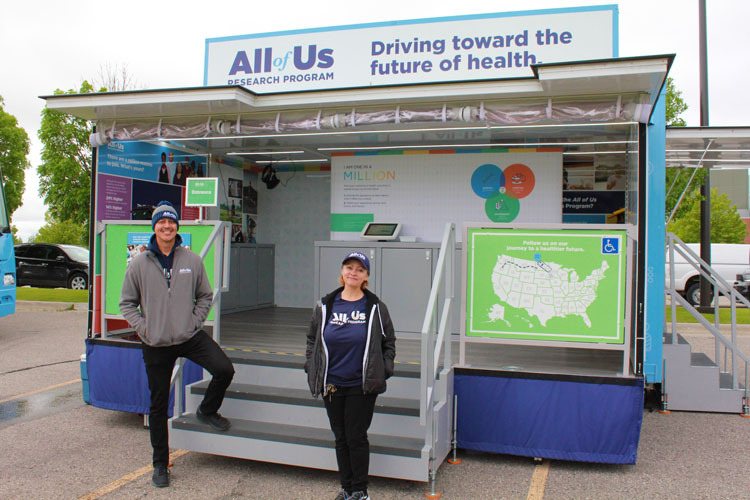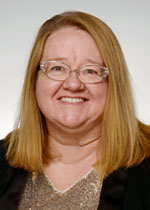All of Us Research Program Makes Stops in North Dakota
By Brenda Haugen on
 In its efforts to enroll at least 1 million
volunteers, the All of Us Research
Program visited three communities in North Dakota
this year, including Fargo, Grand Forks, and Williston.
In its efforts to enroll at least 1 million
volunteers, the All of Us Research
Program visited three communities in North Dakota
this year, including Fargo, Grand Forks, and Williston.
"The NIH (National Institutes of Health) has worked pretty extensively with one of our [principal investigators], Thomasine Heitkamp," said Sherry Zeman, Research and Grants manager at the University of North Dakota (UND) College of Nursing & Professional Disciplines (CNPD). Zeman served as the liaison for the CNPD, the NIH, and the Alerus Center, where All of Us was located during its Grand Forks visit. "Because of those ties, the NIH really wanted to make a stop in Grand Forks in order to show support of the projects on the UND campus at the School of Medicine & Health Sciences and the College of Nursing & Professional Disciplines."
The All of Us Research Program strives to enroll volunteers from all walks of life in an effort to collect health data from a diverse group of people and speed up medical breakthroughs. Volunteers can be healthy or sick, rural or urban, and from any background. The program wants to be inclusive, reaching as varied a group of volunteers as possible, including those who may be underrepresented in current healthcare research. According to Melissa Lopez, tour manager of the All of Us Journey, anyone age 18 or older is invited to enroll in the program. Participants just have to supply a mobile number or email address and live in the U.S., though being a U.S. citizen is not a requirement, she said.
As educators in medicine, it's important for us to support research programs that could advance prevention and treatment plans for patients.
"The All of Us traveling research trailer is a venue collecting data to assist advances in precision medicine," Zeman explained. "Just like precision medicine is important to prescription eyeglasses, it is important to advance treatments specifically designed for individuals. So, rather than prescribe the same treatment for everyone with heart disease, doctors will be able to prescribe treatment based on the patients' backgrounds, environments, health, and other factors. As educators in medicine, it's important for us to support research programs that could advance prevention and treatment plans for patients."

Lopez said the program's survey starts out relatively generic but can focus in more as patterns develop. For instance, she said, she talked to one woman from rural town of about 300 people that had unusually high rates of cancer, something the program can focus on.
There is a much greater emphasis being placed today on prevention, self-management of our own health, and overall population health.
"The National Institute of Health's All of Us study is timely," said Brad Gibbens, deputy director and assistant professor at Center for Rural Health at the UND School of Medicine & Health Sciences. "There is a much greater emphasis being placed today on prevention, self-management of our own health, and overall population health. This effort will give us an opportunity to better understand those factors. Hopefully it can contribute to greater awareness and involvement on the part of the public."
Two All of Us vehicles have been traveling the country doing outreach for the program. Only one has a mobile clinic, which includes an enrollment center, and this came to North Dakota. Lopez explained that the program looks at factors such as genetics, lifestyle, and environment, but for wary volunteers, "it's as much or as little information as you want to give." By the time All of Us reached North Dakota, 212,000 participants had joined the program, she said, including an uptick in the number of women involved.
"I have noticed there has been an increase in women signing up," Lopez said, adding that about 60% of participants are now women.
The All of Us vehicles tend to hit the southern states in winter and northern states during the summer months. Eventually, Lopez said, home visits will be available. And while the traveling booth provides a fun environment for learning and exploring, if you missed its stops in North Dakota, Zeman said, you can still join the program.


 was a communications specialist at the Center for Rural Health at the University of North Dakota School of Medicine & Health Sciences in Grand Forks.
was a communications specialist at the Center for Rural Health at the University of North Dakota School of Medicine & Health Sciences in Grand Forks.



